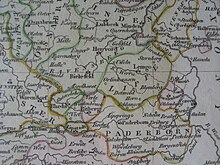County of Lippe Lippe-Detmold Grafschaft Lippe (German) | |||||||||
|---|---|---|---|---|---|---|---|---|---|
| 1413–1789 | |||||||||
 The County of Lippe in the late 18th century | |||||||||
| Status | Allod (to 1528/9) County (1528/9-1789) | ||||||||
| Common languages | German, Low German | ||||||||
| Religion | Largely Lutheran from c. 1500; Calvinist from 1615 | ||||||||
| Government | Feudal monarchy | ||||||||
| Edler Herr, Count | |||||||||
| Historical era | Medieval Europe | ||||||||
• Established | 1413 | ||||||||
• Raised to principality | 1789 | ||||||||
| Currency | Taler (from 1752) | ||||||||
| |||||||||
| Today part of | Germany | ||||||||
The County of Lippe (German: Grafschaft Lippe) or Lippe-Detmold was an Imperial Estate of the Holy Roman Empire. It had its origins in a small lordship on the Lippe river, first attested in 1123, and lands leased from the Bishopric of Paderborn from 1173. In the late twelfth and early thirteenth centuries, the lords of Lippe founded several cities (Lippstadt, Lemgo, Horn, Blomberg, and Detmold), the earliest city-foundations in Westphalia. The territory achieved Imperial immediacy in 1413 at the latest and was part of the Lower Rhenish–Westphalian Circle from 1512. In 1528 or 1529, it was promoted to the status of Imperial County and became part of the College of Lower Rhenish-Westphalian Imperial Counts in the Imperial Diet. Lippe was a centre of conflict during the Reformation as Count Simon V attempted to prevent Protestantism from spreading within his territory by force. Lutheranism was adopted in 1538, two years after his death. Simon VI converted to Calvinism in 1605, leading to a prolonged conflict with Lemgo, which eventually remained Lutheran. On his death in 1613, Simon VI left substantial lands and rights to his younger sons, who formed junior lines: Lippe-Brake and Lippe-Alverissen (which inherited Schaumburg-Lippe in 1644), while the main line became known as Lippe-Detmold. The Counts' efforts to centralise the state and expand its military and bureaucracy in the eighteenth century were stymied by the power of the junior lines and the nobility. In 1789 it became the Principality of Lippe.

